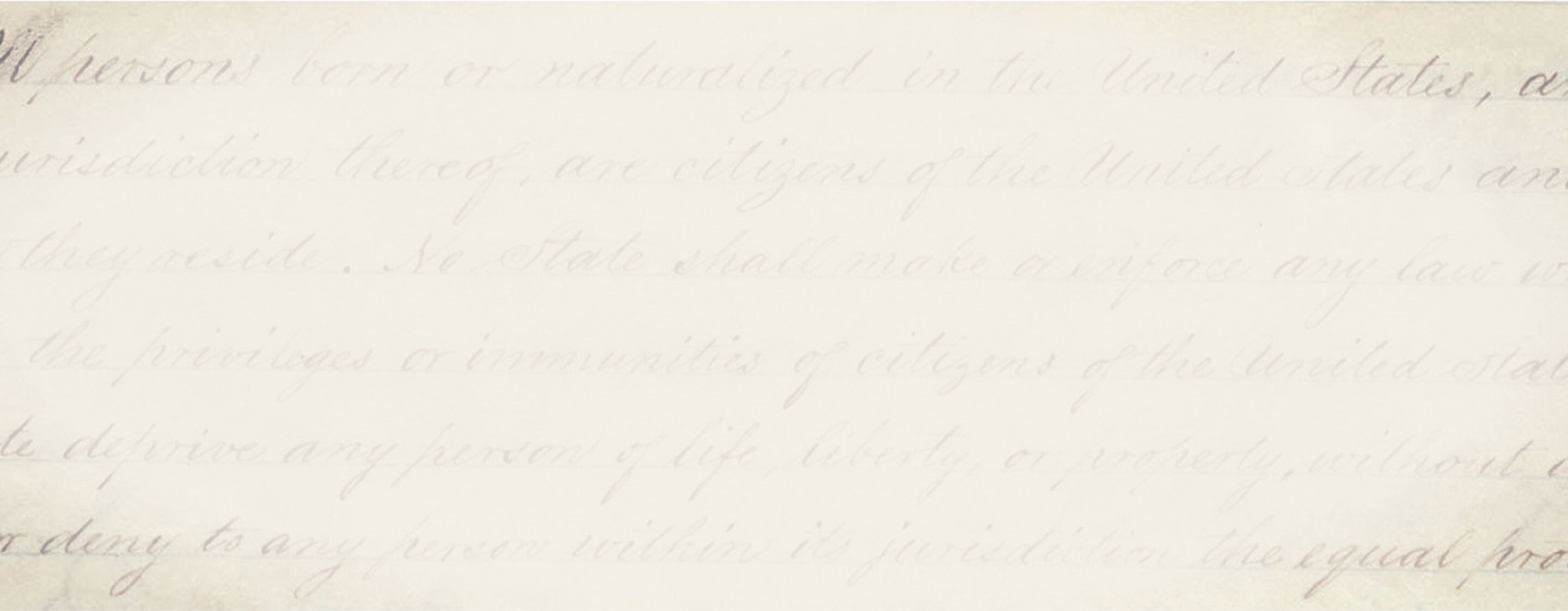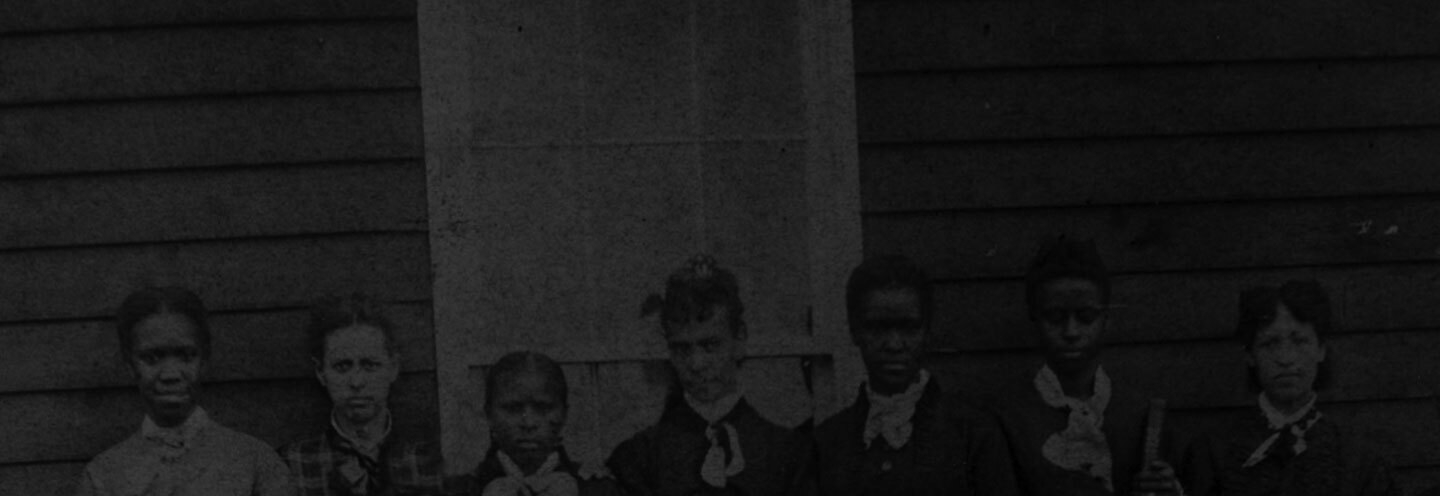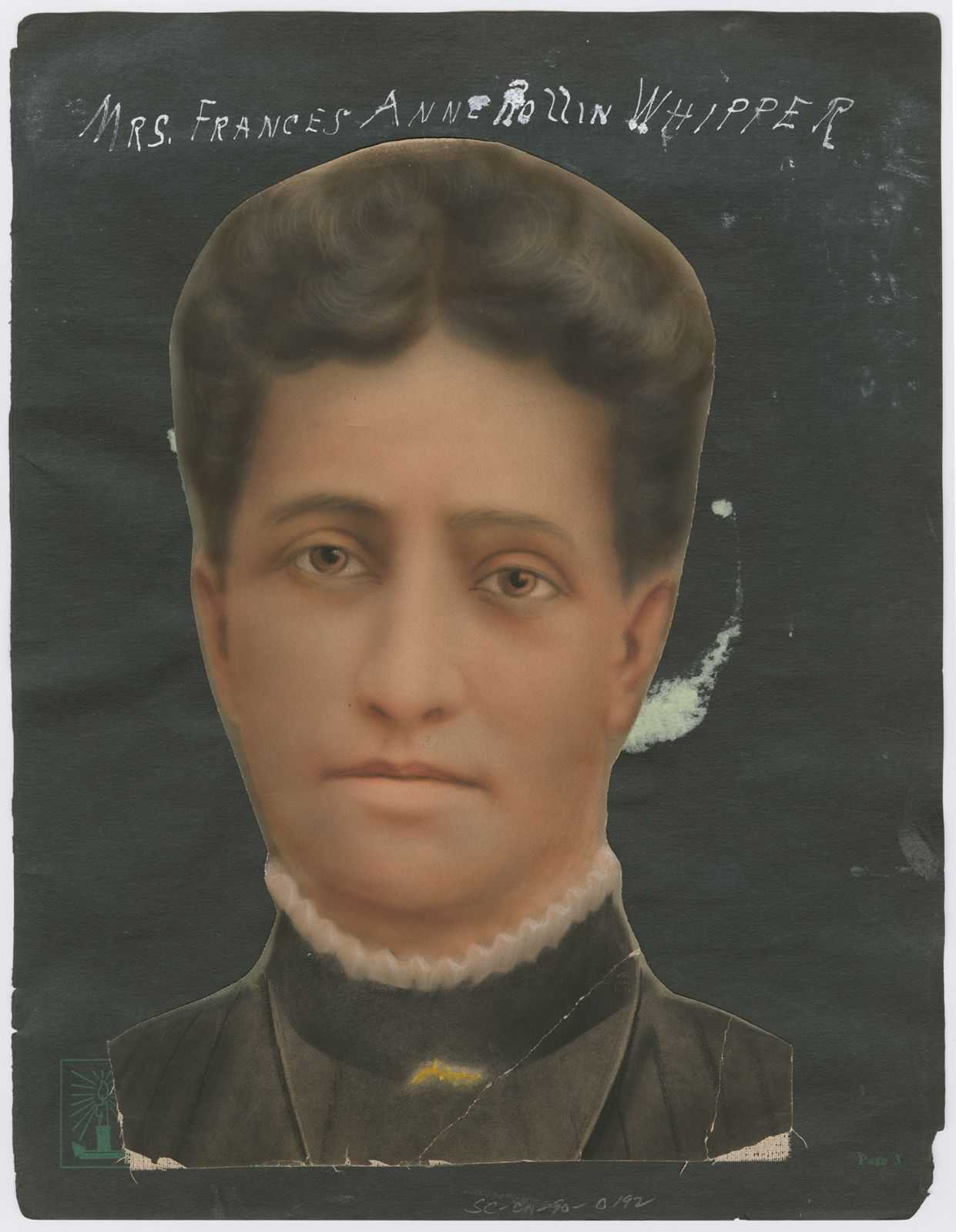Visions of Freedom: Democracy
During Reconstruction, African Americans gained citizenship rights. The United States government recognized these rights by creating three amendments to the Constitution and passing the first federal civil rights acts. These laws promised equal protection, equal access to public accommodations, and the right to vote regardless of race.
But after 1873, the federal government retreated from enforcing civil rights laws. White supremacists used voter suppression, violence, and terror to regain political power in southern states and to strip away the rights gained by African Americans. By the end of the century, in place of democracy, African Americans faced a system of racial discrimination that confined them to second-class citizenship.
The Reconstruction Amendments
Racist political cartoon opposing equal rights for African Americans, 1866
The 13th Amendment, ratified in 1865, outlawed slavery and gave Congress the power to pass new laws to protect civil rights. Under the amendment, newly freed people obtained basic rights previously denied to them such as the right to own property, the right to free speech and assembly, and the right to present evidence in court.
During Reconstruction, African Americans sought and gained the full rights of citizenship, including the right to vote, equal protection under the law, and equal access to public accommodations. These rights were enshrined in the US Constitution by the 14th Amendment (1868), which granted birthright citizenship and equal protection, and the 15th Amendment (1870), which removed racial restrictions on voting rights. Congress also invoked the power of the 13th Amendment to pass the Civil Rights Act of 1875, which banned racial discrimination in public accommodations. Still, federal laws demanded a government willing to enforce them.

I am bound to obey my country and her laws because I am by them protected. When they cease to protect me I can rightly cease to obey them.
Rep. Robert B. Elliott, 1871

The 14th Amendment
Group of people on a plantation, likely a sharecropping family, ca. 1880
After the abolishment of slavery, southern states passed laws known as Black Codes, which restricted the civil rights of newly freed African Americans on the grounds that they were not legally citizens. The 14th Amendment, passed by Congress in 1866, was a direct rebuke to the Black Codes. The amendment defined all persons born in the United States as citizens, and it declared that states could not pass laws that denied citizens their constitutional rights. No person could be deprived of life, liberty, or property without due process (fair treatment by the judicial system), and the law was to be equally applied to everyone.
Equal Protection Enforced
Political cartoon showing the need for federal troops in the South to protect the rights of Black citizens, 1875
White southerners refused to accept the 14th Amendment and continued to violently oppose Black civil rights. In 1867, Congress passed the Reconstruction Acts, which placed former Confederate states under military rule until they ratified the 14th Amendment and established new constitutions guaranteeing equal rights and protections to African Americans. After the amendment was ratified, the federal government enforced equal protection by prosecuting the Ku Klux Klan and other terrorist groups for violating the civil rights of African Americans.
The 15th Amendment
Lithograph celebrating the ratification of the 15th Amendment, 1870
While the Reconstruction Acts of 1867 established voting rights for Black men in the South, most northern states, except Maine and Vermont, still restricted the vote to white men. That changed in 1870 with the ratification of the 15th Amendment, which declared that states could not deny the right to vote “on account of race, color, or previous condition of servitude.” Supporters of the amendment celebrated the opening of the polls to Black men, whose votes helped secure the reelection of Republican president Ulysses S. Grant in 1872.

We ask suffrage not as a favor, not as a privilege,
but as a right based on the ground that we are human beings,
and as such, entitled to all human rights.
Charlotte Rollin, 1870
Black Women and Equal Rights
Officers of the Women’s League in Newport, Rhode Island, ca. 1899
During Reconstruction, Black women sought to claim their full rights of citizenship, including the right to vote. They formed alliances with white women and Black men through organizations like the American Equal Rights Association, which was founded in 1866 to “secure Equal Rights to all American citizens, especially the Right of Suffrage, irrespective of race, color, or sex.”
Black women also formed their own organizations to collectively express and address their political interests and concerns. Some Black women testified before state legislatures and petitioned Congress to advocate for women’s rights. Others went to court to claim and defend their civil rights. Although women would not receive the constitutional right to vote until 1920, Black women activists continued to fight racial and gender discrimination and challenge the nation to fulfill its promise of equal rights and protections for all citizens.

Featured Story
The Remarkable Rollin Sisters
As educators and activists, the Rollin sisters shaped the politics of Reconstruction-era South Carolina. They challenged society’s views of Black women and championed the cause of racial and gender equality.

Civil Rights Act of 1875
The Shackle Broken—by the Genius of Freedom
To expand on the 14th Amendment’s promises of equal rights and protection under the law, civil rights advocates called for new federal legislation to outlaw racial discrimination in public places. In 1875, Congress passed the Civil Rights Act, which guaranteed all persons equal access to public accommodations, including theaters, hotels, and transportation, and allowed anyone denied services on account of race to seek restitution in federal court. Among those who helped secure the bill’s passage were Black members of Congress elected during Reconstruction, including Robert B. Elliott of South Carolina, who gave a famous speech in favor of the legislation.

[This bill] does not seek to confer new rights . . . but simply to prevent and forbid inequality and discrimination on account of race, color, or previous condition of servitude. . . . [It] will determine the civil status, not only of the Negro, but of any other class of citizens who may feel themselves discriminated against.
Rep. Robert B. Elliott, speech in favor of the Civil Rights Act, 1874
Limiting Civil Rights, Denying Equal Protection
Political cartoon celebrating the Civil Rights Act of 1875
Is this a republican form of government? Is this protecting life, liberty, or property? Is this the equal protection of the laws? 1876
Soon after the Civil Rights Act of 1875, the gains made by African Americans during Reconstruction began crumbling away. In 1876, the U.S. Supreme Court ruled that the 14th Amendment did not protect citizens from acts committed by private individuals and gave states responsibility for enforcing civil rights laws. After 1877, the federal government retreated from protecting Black voting rights, and southern states used tactics such as poll taxes and literacy tests to get around the 15th Amendment’s ban on race-based voting laws. In 1883, the Court overturned the Civil Rights Act, ruling that the federal government could not prohibit racial discrimination by private parties and businesses.
Over the next two decades, the Reconstruction Amendments’ power to protect the constitutional rights of African Americans would be further undermined by legal challenges that reestablished the primacy of states’ rights, allowed racial segregation, and relegated Black people to second-class citizenship. Voter suppression, terrorism, and lynching of African Americans became widespread throughout the South.
